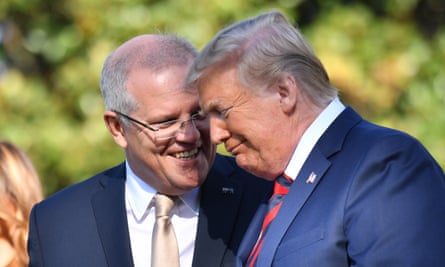Extract from The Guardian

Last modified on Sun 18 Oct 2020 06.46 AEDT
Donald Trump is an international problem. Boris Johnson and Scott Morrison are the proof of it.
It’s not just because he’s withdrawn the most influential economy on Earth from the Paris climate agreement. Or because he’s weakened Nato.
It’s not only because he’s betrayed the Kurds, destroyed faith in American alliances, or snuggled up to Putin and Kim Jong-un. Or summoned whatever occult nefariousness was involved with that weird touching-the-big-glow-ball event in Saudi Arabia.
Trump selling weapons to the Saudis was, of course, far worse. But was it worse than his “trade war” with China? Or his dangerous escalation of tensions with Iran?
Where on the scale of worse, far worse and worst do we place whatever Trump has done to receive his election endorsement from the Taliban?
Ancient Trump classics like abusing Australia’s prime minister on the phone no longer even rate on the list of Trump’s most chaotic acts of “diplomacy”. Neither does physically shoving aside heads of state for a photo op. Or calling other countries “shitholes”. Or bringing his kids to work, when his kids are adults and the work is the freakin’ G20.

Atomic scientists agree: Trump certainly is “creating a nuclear threat worse than the cold war”. And be aware: Trump – both sick with the virus and wired on the psychosis-risking steroid dexamethasone – took America’s nuclear codes with him to hospital; according to Bloomberg, two military aides who carry them around for him also tested positive for coronavirus.
As the US election approaches, the world reflects on these long, lethal past four years. Finally we know what happens when a country hands over its superpower to a lying egomaniacal gameshow host whose true colours are a mango shade of man makeup and lifts. But it’s not just the toxicity of the 45th American president’s direct actions that have made the world so much more unstable and unpleasant. There’s the secondary poison of his passive influence too.
One of the many illusions of political performance is that leadership success can be measured by objective criteria. Greatness, friends, is a matter of comparison. England’s King Richard I was a French-speaking antisemite “with a reputation for violence, cruelty and rape”, yet culture remembers him as “Richard the Lionheart” because the reputational competition was the truly, wuly despised King John.
Similarly, the British prime minister, Boris Johnson, was a rightwing Covid-minimising science denier who ended up in hospital by means of his own incompetence before it was cool. His so far short reign has been characterised by lying, law-breaking, dishonourable behaviour, staggering mismanagement of the virus and a food import framework for post-Brexit Britain literally measurable in proportions of pus. Scots may be reassessing their relationship with Britain, but one suspects the only reason Britons themselves are not rioting is that the smoke from Trump’s own civil chaos can be seen wafting over the Atlantic and, all things considered, chaps don’t think they have it so bad.
In Australia, timid conservative and prime minister Scott Morrison has defined his own leadership style by abrogating all leadership to Australia’s state premiers, who front daily press conferences in increasingly grey states of exhaustion. As unemployment booms and the plague tears a visible trail of dead through Australia’s privatised – but federally-regulated – aged care sector, Morrison ignores his beat while people’s elderly parents die alone. It may indeed be the new “holiday in Waikiki while Australia’s on fire”, but – again – with Trump throwing superspreader parties in the White House, “stunning underperformance” has understandably more appeal than “disease vector”.
Fundamentally, Angela Merkel is an awkward Tory whose chancellorship of Germany is perhaps best described as unadorned competence, yet amid this crew she looks like Jesus.
Certainly, it’s Jesus who I cling to when my own eyes turn towards America, given faith in an unseen God is far less of a challenge than faith in the capacity of Trump’s base to re-evaluate their own electoral choices. The world is unrecognisable from what it was before the last US election; what awaits on the other side of this one is also a fog.
With the Doomsday Clock now set at a mere 100 seconds till midnight, we have the comfort, I guess, of knowing if Trump gets back in, we won’t, at least, have to suffer too long.

No comments:
Post a Comment